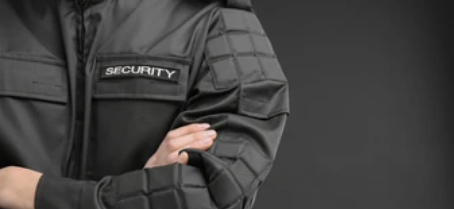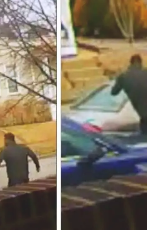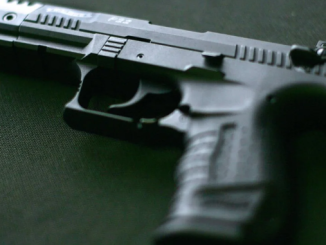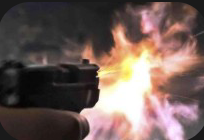
At a recent West Philadelphia community fair for people seeking to have criminal charges expunged from their records, children defied gravity on bouncy houses and residents grooved to the beats of homegrown rappers. Steps away, four armed guards were on patrol to prevent new crimes from being committed.
Across the city, as worshipers arrived at a northeast Philadelphia mosque — a converted single-family home with a congregation so large its members spill out the door and onto the paved lawn and alley — they sought protection not just from Allah, but also from three guards clad in black tactical gear, clutching rifles with Glock handguns on their hips.
Welcome to Philadelphia, where armed guards are summoned to stand sentinel in places where they’ve rarely — if ever — been before. At Jim’s West, a Philly cheesesteak landmark that shut down for four years and reopened in September under new ownership, customers waiting to place orders often chat with and take pictures of the armed guards hired to keep criminals away from the eatery in this hardscrabble slice of West Philly.
{snip}
Certified by the Pennsylvania State Police, the guards’ proliferation, some believe, is a direct result of the city’s record gun-violence epidemic and the police department’s inability to hire and deploy enough officers. Between 2019 and 2022, the number of newly certified private guards and those renewing their licenses rose by 9.5 percent in Philadelphia, from 569 to 623, according to the State Police. Statewide, that number increased by 6.7 percent, from 3,212 to 3,428.
Pennsylvania isn’t alone. Nationally, private security officers outnumber public police 1.3 million to 800,000, said Rick McCann, founder of Private Officer International, a Charlotte, North Carolina-based association that advocates for and tracks the private policing industry. That’s an increase of 33 percent over 10 years; 36 percent of them are armed, he said.
Like others, McCann laments that training requirements for private officers generally fall far short of those in traditional policing. The dark side of the loosely regulated industry, he said, can be understood through sobering numbers: More than 200 private officers are arrested annually for crimes ranging from simple assault to murder; 20,000 are injured on the job; and 118 died in the line of duty last year. “One of the reasons for this is a lack of training,” McCann said. “Every state regulates them differently, and there’s still 11 states that have no regulations whatsoever.”
In September, a private officer patrolling a North Philadelphia gas station fired his assault rifle at a man who threw a rock at him. No one was injured, the officer was not charged, and the man who threw the rock was arrested. The incident, some said, could be a harbinger of the type of bedlam that could ensue as private policing continues to expand. “People in Philadelphia who are patrolling with AR-15 platform-type rifles out in the open at convenience stores,” said McCann. “That hurts security.”
{snip}
To keep its congregants safe, the Northeast Philadelphia Islamic Center turned to Strategic Intervention Tactical Enforcement, a private security agency founded by Andre Boyer. The former Philly cop also has contracts with four other mosques, a Baptist church, 10 gas stations, three hotels, two grocery stores, and six individuals.
“Police manpower is low and police response time is slow. So, people now are asking, ‘what else can we do to be safe?’ This is it,” Boyer said. “The only way you’re going to be safe is to have armed agents like myself out here protecting the public because of the simple fact that there are not enough police officers.”
Boyer employs 25 people he refers to as agents, up from 10 before the start of the COVID-19 pandemic and civil unrest sparked by the police killing of George Floyd in 2020. A letter threatening death and a taunt that “your Quran will not save you,” led the Northeast mosque to reach out to Boyer’s company last year, said Mashuqul Khan, the congregation’s president. “If somebody comes to shoot our community members, our mosque, they will not come with a short gun. They will have a big gun. We need someone with the same kind of gun,” Khan said after a recent Friday afternoon service.
Khan and others embraced Boyer like an old friend. “He’s a good man,” congregant Asir Muhammad said, giving the heavily armed agent a hardy handshake. In addition to shaking Boyer’s hand, Muhammad asked to take a picture with him. With street crime and anti-Islamic sentiment on the rise, he said, having armed security personnel at the mosque is a blessing. “For the protection that they’re giving us, and the love and respect that they’re showing us at the same time, that’s good for us to have since we are under attack,” Muhammad said.
While the congregants are pleased, some are wary about the potential danger that comes from introducing a rifle into everyday situations. “I don’t think it gives people a good feeling or a secure feeling. It makes it look like they want to be a militia or the military, and that’s not what private security or law enforcement was meant to be,” McCann said. “I think you’re asking for trouble.”
The vanishing police officer
While Philadelphia’s Police Department is budgeted to have 6,380 officers this fiscal year, there are currently 5,367 on active duty, meaning 1,013 officer positions — or 18.87 percent — are vacant, according to department data provided to The Trace.
{snip}
Philadelphia Police Department First Deputy Commissioner Frank Vanore acknowledged the uptick in armed guards, but declined to speculate on what is fueling the rise.
“If anybody has a question and they call the police, we will be glad to investigate and ensure that they’re the proper person in the proper place doing what they’re supposed to do,” he said. He noted that the department gets frequent calls about a guard with a long gun who patrols the grounds of a Broad Street gas station in North Philadelphia.
In response to the recruiting struggles, city officials, including Interim Police Commissioner John Stanford, City Council President Darrell Clarke, police union president John McNesby, and Sheriff Rochelle Bilal, sent state lawmakers a letter on October 10 asking that they give police recruits more time to complete fitness and reading requirements.
“We’re at an urgent stage here where we need cops on the street,” McNesby said. “We need to do a better job of getting people on the books.”
Speaker of the Pennsylvania House of Representatives Joanna McClinton is among the state lawmakers who received the letter. Her spokesperson, Nicole Reigelman, said the Philly Democrat is “working with state and local stakeholders to explore legislative remedies to ease recruitment and retention challenges.”
McNesby said that, while he believes private officers are filling a niche, he also worries about their training. “There needs to be some regulation. I don’t believe they should just be standing in a shop with an AR-15,” he said. “That’s just not good.”
Guarding safe spaces?
In Philly, even some violence prevention leaders are turning to armed guards. LaTrista Webb, executive director of the Elevation Project, which provides reentry services to formerly incarcerated men, agonized over security in the weeks leading up to her organization’s expungement block party in July.
“I was hearing about a lot of people canceling events because of gun violence,” she said. “It was like, ‘Am I making the right decision? Is this maybe something we shouldn’t do?’”
She ultimately decided to hire armed security.
{snip}
Webb believes it was money well spent, and plans to use the same security company for future events. “It was such a beautiful day. There were no arguments. No fights,” she said, adding that the rappers had also requested security. “No one pulled out a weapon.”
After the event, Webb said, she cried. “Everybody was like, ‘What’s wrong, everything was amazing,’” she recalled. “I just looked around and I was like, ‘we kept everybody safe.’”
At Jim’s West, as the sun started to set, Brandon Combs stepped out of the front door of the West Philly cheesesteak joint holding a sandwich in one hand and his cellphone in the other. He felt comfortable enough to stop for a few minutes to complete his call, just a few feet from two armed guards.
“Being that Jim’s West is in what is considered to be a high-crime area, and with all the gun violence that’s transpiring in the city of Philadelphia, it’s much better and safer for people to see the outward presence of security,” Combs, 22, said. “When you see a gentleman out here with his vest and rifle, it deters crime.”
* Original Article:
https://www.thetrace.org/2023/10/philadelphia-security-guard-requirements/


